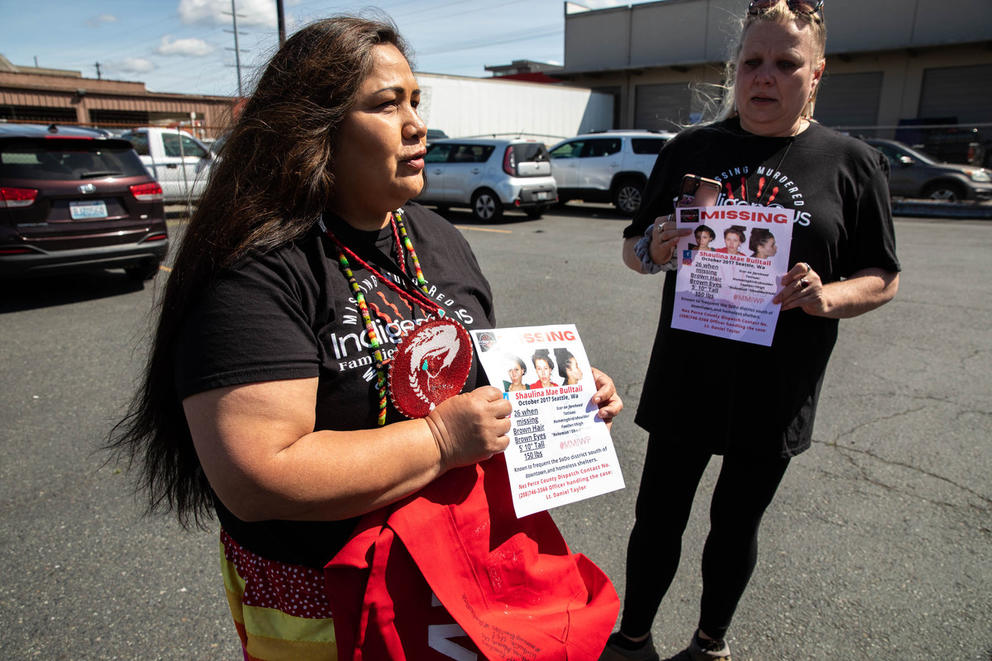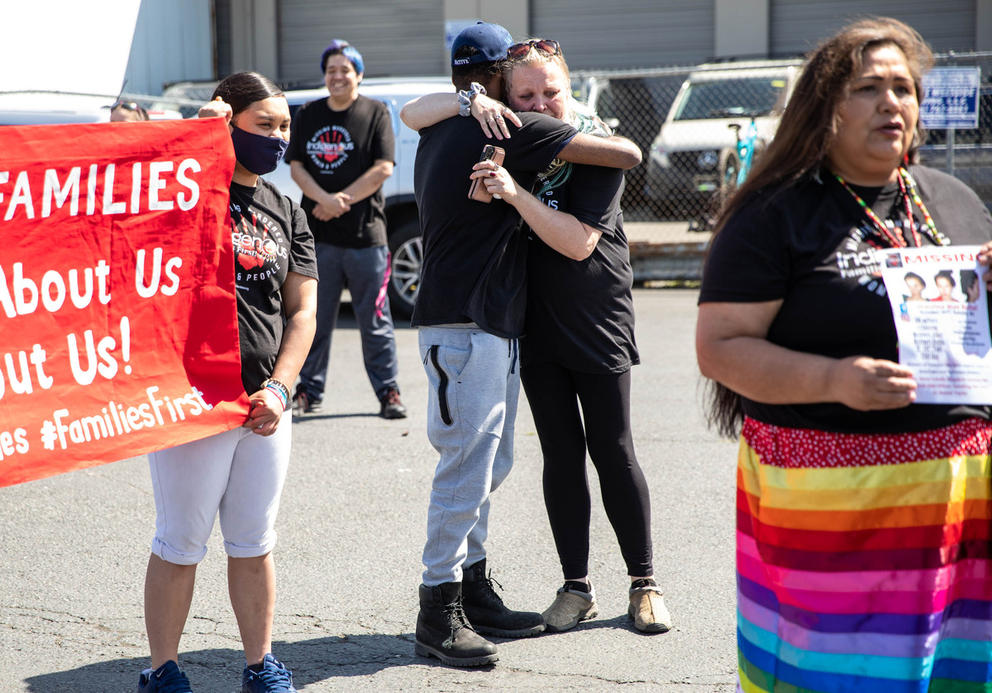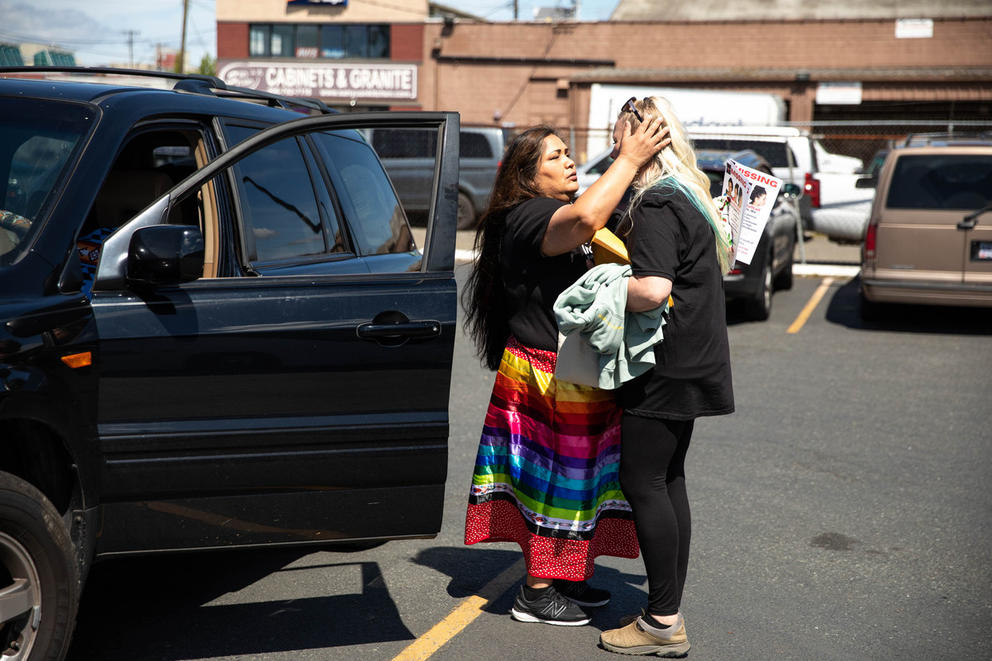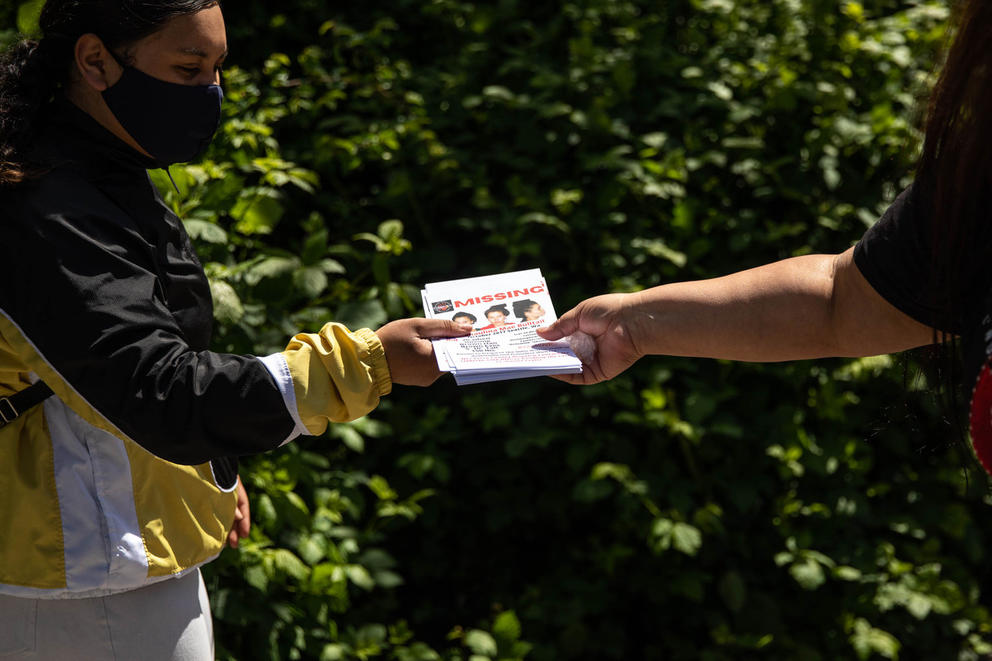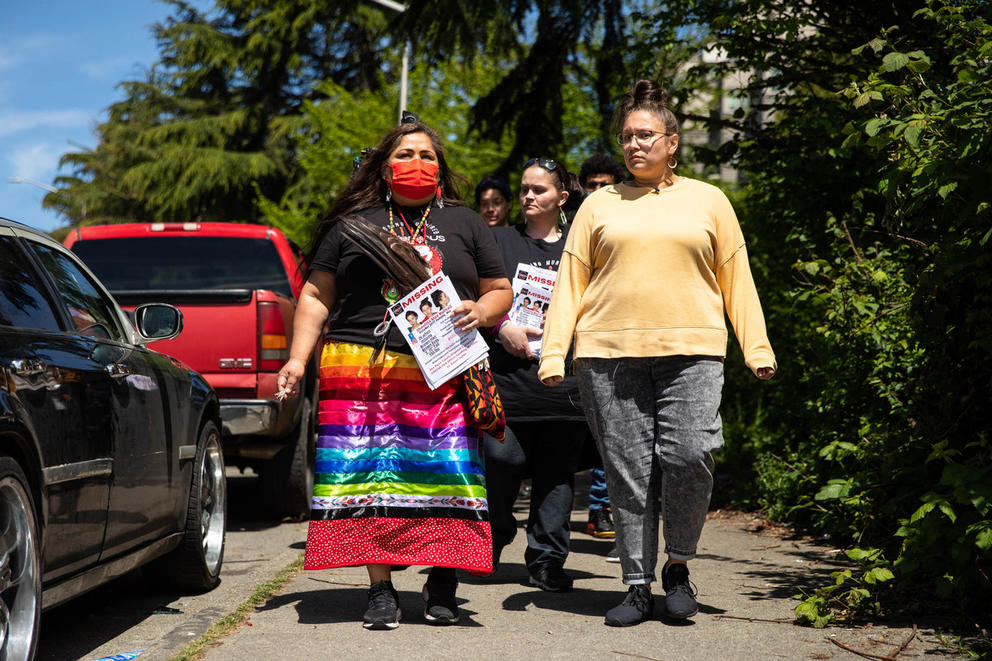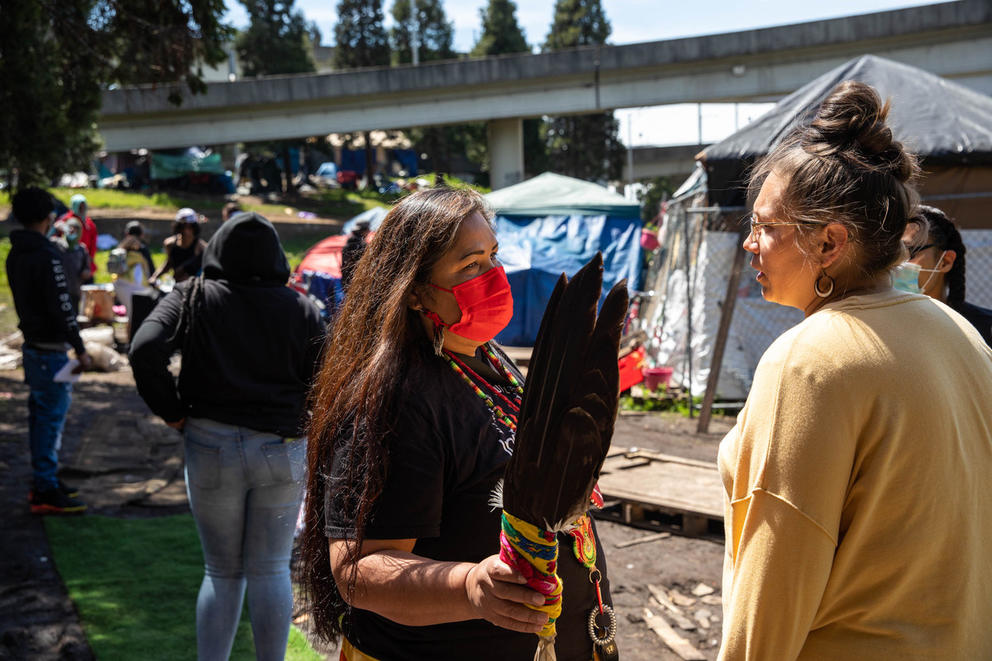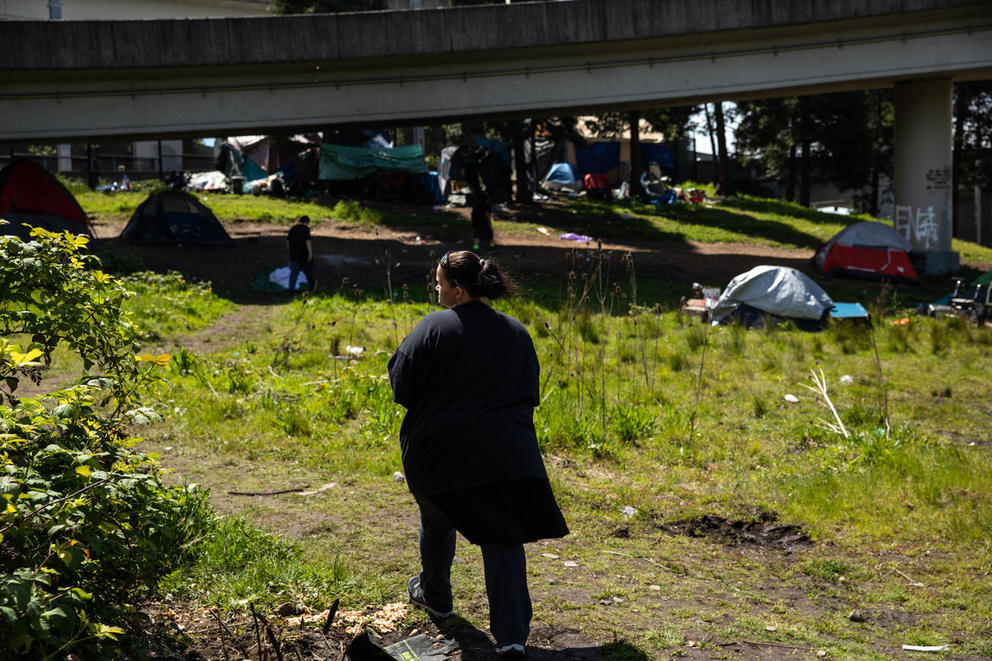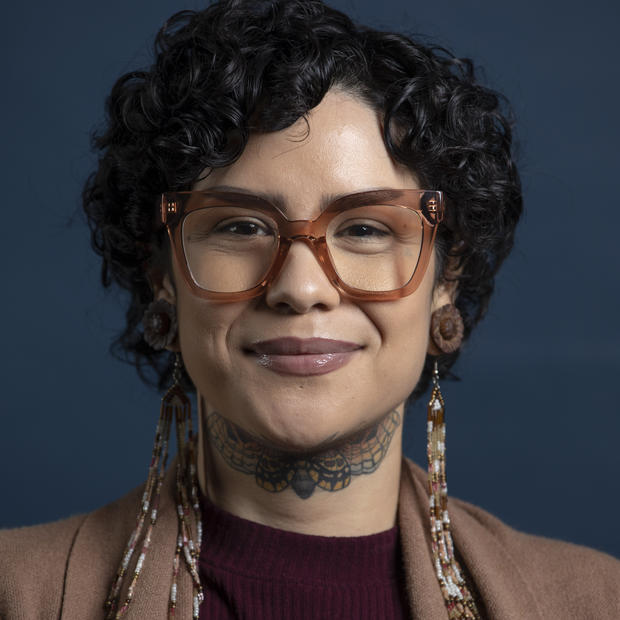“I was called to stand with the families, walk alongside them and help them when their loved one was murdered and they didn't get justice,” she said.
According to data collected by the Attorney General's Office, there are 2,200 unsolved homicides in Washington. Native American women make up nearly 5% of those, although they represent about 2% of the state's population. That’s 110 Native women. According to the Urban Indian Health Institute, Seattle has the highest number of missing and murdered Indigenous people of any city nationwide.
Since Washington began using a new Missing Indigenous Person alert system last July, 22 of 31 missing people were successfully found alive by December. Since the system was launched, one person has been found dead, and as of December eight were still missing.
But many people who are considered missing by their families are not considered missing by local police. If police have contacted them in homeless encampments or in other interactions, no alert was created for them. Of course, families continue to search for those caught up in sex trafficking, drug addiction, or even a mental health crisis, and want to find them before their loved ones go from missing to murdered.
Whether or not an alert is made, families are still doing much of the on-the-ground searching. And this is a major part of White’s grassroots work. White, 50, has worked with more than 200 families over the past seven years, and has led groups of volunteers and family members searching rural reservations to urban city centers.
“Usually what happens when families reach out to me is somebody tells them, ‘You need to talk to Roxanne.’” White said. “I often put my work and the families in front of my family, my grandchildren, my dad, my brother, family gatherings, birthdays, my own house, I put it before everything,” White said. “I’ve dedicated my life to this.”
Rhonda Taylor, center right, mother of Shaulina Bulltail, hugs her nephew Andre Anderson as they speak to the media about Bulltail last year on Wednesday, May 11, 2022 in SoDo. White helped organize a search for Bulltail, who was found later that week. White says she has worked with more than 200 families over the past seven years, and has led groups of volunteers and family members searching for those who have gone missing, from rural reservations to urban city centers. (Amanda Snyder/Crosscut)
Recovery through reconnecting
White dedicated her life to this work after her own healing journey and an introduction to activism at Standing Rock Reservation. Born and raised on the Yakama Nation Reservation, White is Nez Perce, Yakama, Nooksack and Aaniiih. She is also the granddaughter of a boarding school survivor and a survivor of childhood abduction, sexual abuse, human trafficking and domestic violence.
Because of the abuse and trauma she endured, White attempted suicide many times and battled addiction for 32 years, which she says was a way of self-medicating through the trauma.
Now her advocacy is her lifeline.
When Roxanne White was just two weeks clean and sober, she was at a clean and sober pow wow on the Yakama Nation Reservation with a friend. The “golden age” women – 40 and older – were called to dance. As White looked around and wondered why everyone wasn’t standing for the mothers, grandmothers and matriarchs doing the traditional golden age dance in their regalia, she had a spiritual experience.
“I’m looking at them and they’re all looking at me and I see one grandma with a bloody nose and a black eye in torment, crying.” White said. “I saw another grandma with a big lip and just their pure agony. I could hear cries and screams, and they were all walking towards me. They were dancing towards me and I was sobbing.”
At the time she was frightened by the vision, which few believed, even herself. But now White realizes the ancestors were illuminating her calling. “None of that made sense until it was supposed to, but it made me realize that my purpose was to survive, and I have a specific purpose right now that I’m fulfilling,” she said.
From being sex-trafficked at 22 by someone she was close to whom she was using drugs with, White began a long journey of healing, education and processing what had happened to her.
She got sober in 2014 and ended survival sex work, but less than two years later, White was contemplating suicide again while dealing with stress, PTSD, agoraphobia and depression from flashbacks of her old life and lingering unhealed trauma.
“I tried to be a good mother, to be a good daughter and sister, family member and citizen,” White said. “Because of all that trauma, I couldn’t cope. For the longest [time] I could not cope with my flashbacks. I didn't feel safe anywhere.”
She asked the Creator to help her figure out her purpose, and then Standing Rock happened and she felt called to a new purpose.
It was a perilous journey at times, with little money and her fear of public spaces, but friends and family helped her head to Standing Rock.
“The van broke down soon as we got there, but that was by no accident,” White said. “I was supposed to be there for almost two months. That’s where that healing really happened because I was reconnected to my Native spirit, my ancestors; I was reconnected in a way that I didn’t even know how important that was. I didn’t know how much I needed that.”
During her time at the Standing Rock camp, she was gifted a women’s warrior and honor song that originally came to 13 grandmas in a sweat lodge as they were praying for their daughters and grandchildren and the women in their families. The song was for missing and murdered Indigenous women and girls. That’s where she became aware of the movement for MMIWP and that she wasn’t alone in her experiences of physical and sexual abuse.
“I survived and all these women didn’t,” White said. “All these ancestors, grandmothers that never got justice. They never got to speak out against the violence. I realized this is much bigger than me. My liberation came from that experience and that liberated me to break my own silence.”
Working with families
When White returned to Washington from Standing Rock, she continued her environmental justice work and started advocating for MMIWP by sharing her story. She became known as a trusted advocate for the cause, and in 2017 was asked to participate in the January Women’s March. This is where her work centering families of MMIWP began.
This is work she does not do alone; a supportive community is required. White has learned to utilize social media, including the Missing, Murdered Indigenous Women, People & Families Facebook page to gather both financial support and boots on the ground during searches for missing people.
“That’s always been my job, to get the community to show up for the families, and to center the families, which hasn’t been easy,” White said. “My ancestors definitely have been there with me, Creator, but also the community, because if it wasn’t for the people that follow me on social media, sending me $50 here, $20 there for the flyers, we wouldn’t have been able to do it.”
And while White is grateful for the money sent and volunteer hours spent with her over the years, she says it hasn’t been enough to sustain the amount of labor necessary to support all of the families who come to her for guidance. So after a brief break from 60-hour weeks and neglecting her own health, White is now saying it out loud: She needs more sustainable support for the work she is doing for and with these families.
“Part of the cultural teaching is to pass things along,” White said. “We’re supposed to teach others. We’re not supposed to do things alone.”
She wants to be able to pay people for their time, and also to raise more awareness of the MMIWP epidemic and make sure the families get the support they need.
“I’m still here, and I’m strong,” White said. “Let’s meet the needs of our community, not just the bare minimum. Let’s do the work.”
On Wednesday, May 11, 2022, family and friends of Shaulina Bulltail walk around a SoDo homeless encampment to ask about Bulltail, who went missing last year. According to the Urban Indian Health Institute, Seattle has the highest number of missing and murdered Indigenous people of any city nationwide. (Amanda Snyder/Crosscut)

